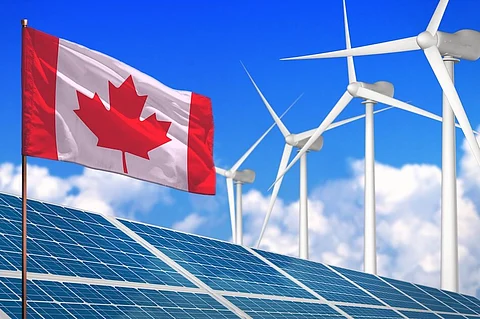
- NEWSNEWS
- OPINIONOPINION
- WATCH
- BUSINESS
- FEATURES
- DONATE
- ABOUT USABOUT US
- PUBLICATIONSPUBLICATIONS

The Department of Public Works on Tuesday acknowledged solar panels, when disposed of after their short life spans, leak toxic chemicals into groundwater.
Yet, federal research has found recycling the solar panels, which have a lifespan of only 20 to 30 years, is too costly, per Blacklock’s Reporter.
Solar panels when disposed of in landfills pose a “significant pollution risk” to the environment, the department wrote in a notice to contractors.
“The volume of end of life solar panels will grow which will result in significant pollution risks,”
“In fact the Government of Canada already utilizes solar panels in seven different locations across the country and in more than five missions around the world.”
Under climate targets “the use of solar panels by the Government of Canada is projected to keep increasing, both domestically and abroad,” said the notice on solar panel recycling.
“The overall environmental impact of solar panels is much higher if they are dumped in landfills where hazardous chemicals and heavy metals can leach into groundwater.”
The department budgeted $1.2 million for research on how to recycle panels at low cost. Panels contain aluminum, tellurium, antimony, gallium and indium “in some thin film modules which are currently not being recycled” due to high cost, it said.
“Solar panels are constructed in such a manner that the many parts comprising the panel are difficult to separate and recycle individually.”
“Separating those materials and uniquely recycling them is a complex and expensive process as opposed to the cheap method of discarding the entire panel into a landfill.”
“These individual materials are often part of the devices that Canadians use every day such as smartphones and computers.”
“As such, recycling these materials should provide significant economic, environmental and social benefits. This challenge will be seeking recycling solutions for solar panels at any time during their entire lifecycle.”
The pollution warning on solar panels followed 2022 testimony at the Senate human rights committee that the supply chain in the renewable energy sector relies on forced labour including children. “Look at issues like modern slavery and the environment not just from a domestic standpoint but also from an international standpoint,” testified Chris Crewther, then-director with the US-based Global Fund to End Modern Slavery.
About 40% polysilicon used to manufacturer solar panels originates from Xinjiang, China, home to slave camps of Uyghur Muslims. A House of Commons foreign affairs subcommittee in 2019 called the Uyghur camps “the largest mass detention of a minority community since the Holocaust.”
Crewther said other green supply chains also conceal atrocities. “You have situations such as in the Democratic Republic of Congo where over 35,000 children are in child labour mining cobalt which is used in lithium ion batteries in electric cars,” said Crewther.
“Another example on the environmental topic is the balsa wood in Ecuador which is being illegally logged and is impacting Indigenous populations,” said Crewther.
“That balsa wood is being used for wind turbines.”
